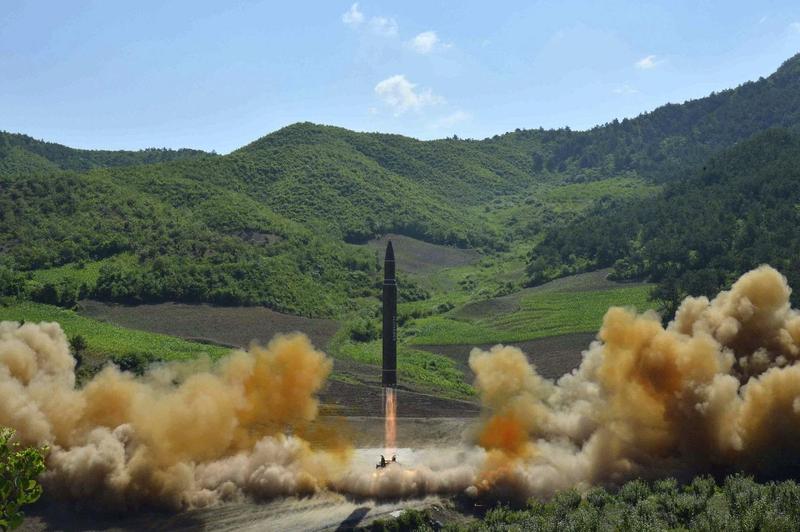
The Telegraph writes that American officials confirmed North Korea's claim on Tuesday to have successfully launched its first intercontinental ballistic missile (ICBM), suggesting Pyongyang was now capable of attacking the continental US and provoking immediate international condemnation. Russia and China laid out a plan for defusing tensions, suggesting that Pyongyang halt nuclear and missile tests while the US and South Korea refrain from large-scale military exercises. The joint statement, issued after talks between Vladimir Putin and Xi Jinping, came as analysts suggested the test could represent a game-changing moment in the world's most dangerous nuclear stand-off. The US military tracked the missile's steep parabolic path for 37 minutes. Experts said a flatter trajectory might give the missile a range of approximately 4,160 miles, a marked improvement on previous models and one that would put Alaska within reach. Pentagon officials told NBC News they believed North Korea had successfully launched its first ICBM. They said it had a two-stage design of a type not seen before and its range was greater than the 3,400 miles required to be classed as ICBM.
The Washington Post opines: As the Friday start of the Group of 20 economic summit in Hamburg approaches, the Trump administration represents one of the chief sources of uncertainty in global trade. It has been just over two months since President Trump ordered a review of how steel imports affect American national security, which could usher in protectionist measures on a wide range of products from a wide range of countries...The question is whether a unilateral American invocation of the president's rarely used power to create national security exceptions to normal trade law is the right way to deal with this situation. Probably not. Given China's relatively small U.S. market share , and the fact that anti-dumping and countervailing measures already apply to China, it is not clear what could be accomplished through new barriers to imports — unless they were applied to other steel exporters. And applying trade barriers to those other countries makes no sense, in national security terms, because most of them are at worst not hostile to the United States and in many cases are close U.S. allies. In fact, of the top 10 foreign steel suppliers, of which Canada is the largest, six are tied to the United States through NATO, NAFTA or bilateral defense treaties; two others, Taiwan and Brazil, are old U.S. friends.
- 2017-07-03 China's Bond Market Is Attractive for the Wary
- 2017-07-02 South China Sea: US warship sails close to disputed island
- 2017-06-30 U.S. Imposes New Sanctions Over North Korea Ties
- 2017-06-30 U.S. Imposes New Sanctions Over North Korea Ties
- 2017-06-29 China Tells U.S. Senate to Keep Its Nose Out of Taiwan
- 2017-06-28 Soybean Diplomacy: New U.S. Ambassador to China Touts Agricultural Trade
- 2017-06-27 China And The U.S. Are Cooling Their Cooperation To Curb North Korea
- 2017-06-27 China And The U.S. Are Cooling Their Cooperation To Curb North Korea
- 2017-06-26 New U.S. ambassador to China says North Korea a top priority
- 2017-06-25 There's No End in Sight for China's Rise Up the GDP Rankings
- Reuters Russia and China tell North Korea, US and South Korea to embrace de-escalation plan
- Bloomberg Kim Jong Un Seeks to Exploit US-China Tensions With Missile Claims
- Bloomberg Don't Blame China For This Korean Car Crash
- Financial Times China's box office boosted 20% in Q2 by foreign movies
- New York Times Moscow, Beijing to Inject Additional $1 Billion Into Russia-China Investment Fund
- New York Times China's Shadow Banking Lacks Sufficient Regulation-Central Bank
- Financial Times Beijing delays licensing tech groups to give consumers credit scores
- Bloomberg China's Electric Cars Are Actually Pretty Dirty
- Bloomberg China's $162 Billion of Dealmaker Debt Raises Alarm
- Financial Times Tencent value slides $15bn in video game backlash
- New York Times China's Vision for a Straddling Bus Dissolves in Scandal and Arrests
- Wall Street Journal China Discards a Treaty With Britain
- New York Times Trump's Trade Choice: Follow the Postwar Order or Blow It Up
- CNN China won't bail out Trump on North Korea
- The Guardian China-Russia diplomatic double act exposes Trump's crudeness
- Reuters Panda diplomacy: Merkel and Xi pushed into awkward embrace before G20
